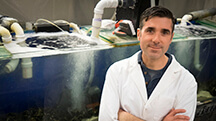Purdue adhesive could work underwater, in wet conditions for medical, construction, manufacturing industries
April 2, 2015
 |
|
Jonathan Wilker, Purdue University professor of chemistry and materials engineering, studies materials created by shellfish that allow them to stick to one another and other surfaces. An adhesive created by Wilker mimics the material and could be developed by industry partners for applications in sectors including biomedical, cosmetics, construction and manufacturing. (Purdue Research Foundation photo) |
WEST LAFAYETTE, Ind. - A Purdue University chemist has developed an adhesive technology that could help bond items in wet, moist conditions such as human tissue or underwater construction - by studying mussels and oysters.
Jonathan Wilker, professor of chemistry and materials engineering, developed the adhesive while studying the environmentally friendly adhesive qualities of mussels and other shellfish. Wilker's patented adhesive is comprised of similar components used by mussels in their natural adhesives.
"A lot of the chemistry involved in the animals' adhesive is protein-based, but no one is going to be able to make a complicated protein for large-scale applications. So we are substituting simple polymers for the proteins while maintaining other aspects of the adhesive chemistry," he said. "We have looked at the design and synthesis changes that we can make and compared our adhesive to what the shellfish are making. The system can be easy to generate on large scales and yet still maintain the functions that we are after. This synthetic mimic approach then allows us to tailor the material for specific bonding situations and applications."
Conventional adhesives currently available are made from petroleum feedstocks and can release volatile organic compounds and other toxic materials into the environment. Wilker's technology can be developed from renewable resources.
A video about the adhesive technology is available at http://youtu.be/PReTYtw3MCM.
Wilker and his team have created a platform technology that industry partners could develop in several ways.
"We can design certain characteristics into the adhesive, but we won't be able to focus on a specific product for a specific application," he said. "It's possible that we could connect with different companies that can develop the materials for several sectors including aeronautical or automotive manufacturing, biomedical joining of tissues, construction, coatings and cosmetics."
Purdue Research Foundation Office of Technology Commercialization received a patent for Wilker's technology. For more information, contact innovation@prf.org
Boiling Point LLC, which established a partnership to commercialize Purdue University innovations, has optioned Wilker's adhesive technology and also is marketing it to prospective licensees.
About Purdue Research Foundation Office of Technology Commercialization
The Purdue Research Foundation Office of Technology Commercialization operates one of the most comprehensive technology-transfer programs among leading research universities in the U.S. Services provided by this office support the economic development initiatives of Purdue University and benefit the university's academic activities. The office is managed by the Purdue Research Foundation, which received the 2014 Incubator Network of the Year from the National Business Incubation Association for its work in entrepreneurship. For more information about funding and investment opportunities in startups based on a Purdue innovation, contact the Purdue Foundry at foundry@prf.org. For more information on licensing a Purdue innovation, contact the Office of Technology Commercialization at innovation@prf.org
Purdue Research Foundation contact: Steve Martin, 765-588-3342, sgmartin@prf.org

